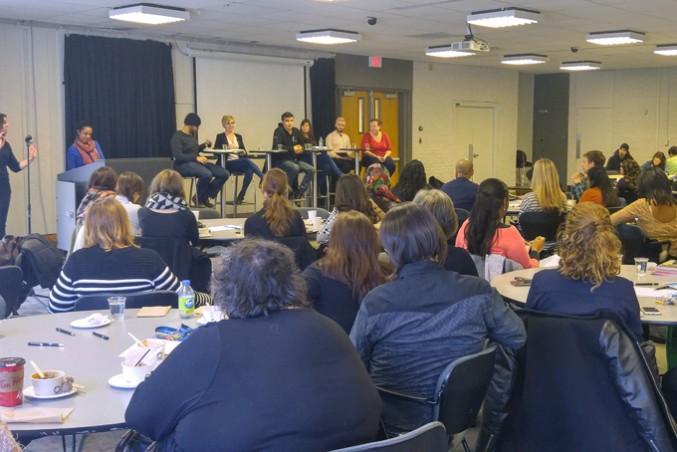By Zeinab Saidoun
The Office of Equity, Diversity and Inclusion held their Soup and Substance event on Feb. 23. This was the second panel discussion for the winter semester and the topic was the various challenges and experiences students faced on Ryerson campus.
The panelists included a diverse range of students that each had unique experiences to share with the Ryerson community. The panel included Daoud Ghanim, community and chair director of the Ryerson Muslim Students Association, Alyson Rogers, co-founder of the Ryerson Feminist Collective, Hadas Hait, previous president of Students Supporting Israel at Ryerson, Evan Roy from the Trans Collective, Mark Szkoda, student affairs director of the Indigenous Students Association at Ryerson and Michelle Woolfrey, a leader in Student Life programs at Ryerson.
A common topic of discussion was discrimination due to religious beliefs. Ghanim focused on the aftermath of the Paris attacks and its affect on Muslim students.
“We had students tell us they were spat on, chased and verbally assaulted,” said Ghanim. “Many feared coming to school, taking the TTC or walking around Dundas Square.”
According to Ghanim, this is a pressing issue and that students should never fear for their safety, especially at their university.
Hait spoke about similar experiences, such as Israel being ripped out of a map on campus.
“I am in no way ashamed of my beliefs and religion, but I’ve stopped wearing religious symbols simply because I fear for my safety,” Hait said.
Rogers also spoke about fearing for her safety due to the presence of a men’s issues group on campus. She also mentioned the anti-feminist threats against University of Toronto students last semester. She said that Ryerson students could have also been targeted.
Next on the panel was Szkoda who discussed indigenous issues. He explained that there is a stigma around indigenous people getting “free schooling.” Szkoda said that many students don’t realize that this isn’t the case, since indigenous students must keep up a certain average in order to receive their funding.
“I had a lot of personal issues last semester and wasn’t able to keep up my marks. I lost funding,” said Szkoda. “That’s what people don’t realize, it’s not unconditional money.”
Roy then went on to explain that transgender people may feel powerless in a classroom where only he and she pronouns are used. They spoke about how students don’t feel represented in the classroom when professors don’t use they, their and them pronouns.
Roy also mentioned various instances where transgender students were openly targeted on campus.
“This is not acceptable,” said Roy. “I fear for my safety if I want to wear a skirt or a dress.”
Last on the panel was Woolfrey who started off to say that overall, she appreciates the way Ryerson provides for students with disabilities. Woolfrey is visually impaired and she has a service dog named Thompson.
She said that although we have the classrooms, security and seats for students with disabilities, attitude barriers need to be worked on in order to have an even more inclusive environment.
“Many people are scared of Thompson, and often tell me that he needs to go away,” Woolfrey said. “I would never say I’m afraid of your eyes, [and for you to] go away.”
The panelists were then asked what Ryerson could do to improve making campus more accessible, accepting and safe.
The suggestions included recognizing Islamophobia as a major issue on campus, having Ryerson make a clear statement on being against sexism and that the university should have a pow-wow on campus.
All of the panelists agreed that the major importance is that these issues are seriously by recognizing them, acting on them and working on prevention.
CORRECTION: In an earlier version of this story, which was published online on Feb. 24:
- Alyson Rogers was incorrectly said to have feared for her safety due to threats against U of T students.
- Evan Roy was identified with the incorrect pronouns.
- Hadas Hait was incorrectly said to have had her Israeli flag spat at while at a rally at Ryerson.
The Eyeopener regrets these errors.












Evan Roy
Please update my pronouns to they/them. I do not use he/his.
Eyeopener Staff
This has been fixed, our apologies for the mistake!
Hadas Hait
Please fix this sentence “Hait also spoke about similar experiences where she had her Israeli flag spat on at a rally at Ryerson” as this is not what I said. I said that I was spat at while filming a video with another student group on campus.